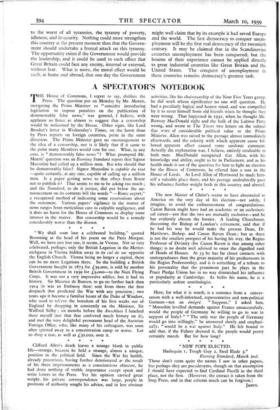A SPECTATOR'S NOTEBOOK
THE House of Commons, I regret to say, dislikes the Press. The question put on Monday by Mr. Morris, instigating the Prime Minister to "consider introducing legislation to impose penalties on the publication of demonstrably false news," was greeted, I believe, with applause so fierce as almost to suggest that a censorship would be welcomed by the House. Other signs, like Lord Brocket's letter in Wednesday's Times, on the harm done by Press reports on foreign countries, point in the same direction. The Prime Minister gave no encouragement to the idea of a censorship, nor is it likely that if it came to the point many Members would vote for one. What, in any case, is "demonstrably false news "? What prompted Mr. Morris' question was an Evening Standard report that Signor Mussolini had called up a million men. But why should that be demonstrably false? Signor Mussolini is capable du tout —quite certainly, at any rate, capable of calling up a million men. Is a paper getting news to that effect from Rome not to publish it? That seems to me to be asking too much ; and the Standard, to do it justice, did put below the an- nouncement on its contents bill the words "—Rome report," a recognised method of indicating some reservations about the statement. Various papers' vigilance in the matter of news ranges from meticulous care to culpable negligence, and it does no harm for the House of Commons to display some interest in the matter. But censorship would be a remedy considerably worse than the disease.










































 Previous page
Previous page